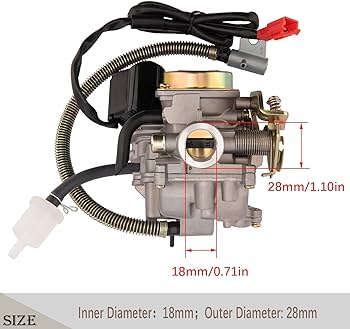When spark plugs are lean, there is not enough fuel in the air-fuel mixture, causing potential overheating. On the other hand, rich spark plugs point to an excess of fuel, which can lead to incomplete combustion and the fouling of the spark plug.
Spark plugs play a crucial role in the ignition process of an internal combustion engine. Understanding the characteristics of lean and rich spark plugs is important for maintaining the efficiency and performance of the engine. This article aims to shed light on the differences between lean and rich spark plugs, their impact on engine performance, and how to identify and address these issues.
By the end of this article, you will have a clear understanding of the implications of lean and rich spark plugs on your vehicle’s engine.
Contents
Understanding Spark Plugs Lean Vs Rich
When it comes to understanding spark plugs lean vs rich, it’s crucial to comprehend the impact they have on engine performance, combustion process, vehicle efficiency, and emissions. Spark plugs play a significant role in the overall functioning of an engine, and understanding the difference between lean and rich conditions can help maintain optimal performance and emission levels in a vehicle.
Importance In Engine Performance
Spark plugs are essential components of an engine as they are responsible for igniting the air-fuel mixture in the combustion chamber. They play a crucial role in ensuring that the engine operates efficiently and smoothly. In a lean condition, the air-fuel mixture has more air and less fuel, often resulting in a hotter combustion. Conversely, in a rich condition, there is an excess of fuel, leading to cooler combustion. Both conditions can have a significant impact on the engine’s performance, making it essential to maintain the ideal air-fuel ratio for optimal combustion.
Role In Combustion Process
The combustion process is heavily influenced by the condition of spark plugs. In a lean condition, the spark plugs may be subjected to higher temperatures due to the excess air, which can lead to potential damage and pre-ignition. On the other hand, a rich condition can cause incomplete combustion and the build-up of carbon deposits on the spark plugs. Understanding these conditions and their effects on the combustion process is crucial for maintaining the longevity and efficiency of the engine.
Effects On Vehicle Efficiency And Emissions
Vehicle efficiency and emissions can be directly impacted by the condition of spark plugs. In a lean condition, the engine may run hotter, leading to potential damage and decreased fuel efficiency. In contrast, a rich condition can result in increased emissions due to incomplete combustion. Ensuring that the spark plugs maintain the proper air-fuel ratio is essential for maximizing vehicle efficiency and minimizing harmful emissions.
Signs Of Lean Spark Plug Conditions
When spark plugs operate in a lean condition, it indicates that the air and fuel mixture entering the engine’s combustion chamber contains too little fuel. This may result from various factors, potentially leading to detrimental effects on the engine’s performance and health. Recognizing the signs of lean spark plug conditions is crucial for preventing severe damage to the engine.
Appearance And Symptoms
Lean spark plug conditions can exhibit distinctive physical traits and symptoms that serve as red flags for potential issues. When examining the spark plugs, certain appearances can indicate a lean condition, such as a white or light gray coloration on the insulator nose and electrodes. Furthermore, indications of excessive heat, like blistering or melting of the electrodes, are common in lean spark plug conditions.
- Irregular engine idling or stalling
- Decreased acceleration and power
- Engine misfires or backfires
- Elevated engine temperature
Potential Causes And Diagnostics
Identifying the underlying causes of lean spark plug conditions is imperative for resolving the issue effectively. Common potential causes include a vacuum leak, a malfunctioning fuel injector, a clogged fuel filter, or a malfunctioning fuel pump. To diagnose the specific cause, conducting a thorough inspection of the fuel delivery system and intake components is essential. This may involve testing the fuel pressure, inspecting vacuum hoses for leaks, and examining the fuel injector performance.
Impact On Engine Health And Performance
A lean condition can have profound implications for the engine’s overall health and operation. It may lead to increased engine wear, particularly on the piston rings, cylinder walls, and valves. Additionally, prolonged operation in a lean condition can elevate the risk of detonation, resulting in potential damage to the pistons and connecting rods. Moreover, the engine’s efficiency and power output are compromised, ultimately affecting the vehicle’s overall performance.
Optimal Fuel Mixture For Spark Plugs
The optimal fuel mixture for spark plugs is crucial for maintaining the efficiency and performance of your vehicle’s engine. Balancing the air-fuel ratio, understanding the differences between lean and rich mixtures, and recognizing the significance for spark plug functionality are key aspects to consider when striving for an optimal fuel mixture.
Balancing Air-fuel Ratio
Achieving the ideal balance between air and fuel in the combustion chamber is vital for the proper functioning of spark plugs. This balance is typically referred to as the stoichiometric ratio, where the air-fuel mixture is perfectly balanced for efficient combustion. Too much fuel results in a rich mixture, while too little fuel leads to a lean mixture.
Differences Between Lean And Rich Mixtures
A lean mixture contains an excessive amount of air compared to fuel, leading to a higher air-to-fuel ratio. On the contrary, a rich mixture contains an abundance of fuel in comparison to air, resulting in a lower air-to-fuel ratio. Both conditions can have detrimental effects on engine performance, emission levels, and spark plug longevity.
Significance For Spark Plug Functionality
The optimal fuel mixture is essential for spark plug functionality, as it directly impacts the combustion process. A lean mixture can lead to increased temperatures in the combustion chamber, potentially causing pre-ignition and damaging the spark plug. On the other hand, a rich mixture can result in fouling of the spark plug due to incomplete combustion, leading to misfires and reduced engine performance.

Rich Spark Plug Indicators
Rich spark plug indicators can signal a fuel mixture that is too fuel-rich or lean. These indicators offer crucial insight into engine performance and can help diagnose potential issues. Understanding the difference between rich and lean spark plug indicators is essential for maintaining optimal engine function and fuel efficiency.
Visual And Performance Clues
Rich spark plug indicators can be visually identified by several notable signs. A black, sooty appearance on the spark plug electrode and insulator is a common visual clue of a rich air-fuel mixture. Additionally, a wet, oily appearance may be present on the spark plug, indicating excessive fuel within the combustion chamber. Performance-wise, a rich condition is often characterized by poor acceleration, rough idling and excessive fuel consumption.
Underlying Reasons For Rich Conditions
Rich conditions are typically caused by a miscalibrated or malfunctioning carburetor or fuel injection system. Other potential causes include faulty oxygen sensors, clogged air filters, inaccurate fuel pressure, or defective spark plugs.
Consequences For Engine Operation
A rich air-fuel mixture can lead to adverse consequences for engine operation. These include inefficient fuel combustion, decreased power output, increased engine wear due to excessive carbon buildup, and harmful emissions.
Spark Plugs Lean Vs Rich: Comparative Analysis
When it comes to the performance of spark plugs, understanding the difference between lean and rich mixtures is crucial for maintaining an efficient and environmentally friendly engine. Each type of mixture has its own impact on fuel efficiency, emissions, and engine longevity. This comparative analysis delves into the effects of lean and rich spark plug mixtures on various aspects, providing insight into the optimal choice for your vehicle.
Effects On Fuel Economy
Lean Mixture: A lean spark plug mixture contains more air and less fuel, resulting in a higher air-to-fuel ratio. While this may lead to improved fuel economy due to less fuel consumption, it can also lead to increased engine heat and potential combustion issues.
Rich Mixture: Contrarily, a rich spark plug mixture consists of more fuel and less air, leading to a lower air-to-fuel ratio. While it may result in better engine cooling and reduced combustion temperature, it can also lead to decreased fuel efficiency due to excess fuel consumption.
Emissions And Environmental Impact
Lean Mixture: A lean spark plug mixture tends to produce lower emissions of carbon monoxide and hydrocarbons. However, it can increase the emission of nitrogen oxides, contributing to air pollution and environmental concerns.
Rich Mixture: On the other hand, a rich spark plug mixture may produce higher levels of carbon monoxide and hydrocarbons, but can help decrease nitrogen oxide emissions, thereby offering potential environmental benefits.
Engine Longevity And Maintenance Considerations
Lean Mixture: Excessive lean mixture can lead to increased combustion temperature, potentially causing damage to engine components. It may also contribute to the formation of harmful engine deposits, increasing the need for regular maintenance.
Rich Mixture: A rich spark plug mixture can improve engine cooling and reduce the risk of engine overheating. However, it may lead to carbon buildup in the engine, necessitating periodic maintenance and cleaning to ensure optimal engine longevity.
Adjusting Spark Plug Performance
Welcome to our blog post on adjusting spark plug performance, where we’ll delve into the key factors affecting spark plug performance and how to optimize it for ideal engine operation. One crucial aspect of spark plug performance is the air-fuel mixture, which can be diagnosed and optimized to ensure that your engine runs at its best.
Methods For Diagnosing Mixture Issues
Diagnosing mixture issues is crucial to ensure your engine’s efficiency and longevity. When your spark plug indicates a lean or rich condition, it’s essential to address the underlying mixture problems. Some diagnostic methods include:
- Visual inspection of spark plug color and deposits
- Using a wideband oxygen sensor to monitor air-fuel ratio
- Utilizing a scanning tool to analyze engine data and fuel trims
Tuning Tips For Optimal Air-fuel Ratio
Optimizing the air-fuel ratio is key to achieving smooth and efficient engine performance. Here are some tuning tips to achieve the optimal air-fuel ratio:
- Use a quality air-fuel ratio meter for precise tuning
- Adjust fuel delivery with a programmable engine management system
- Perform a dyno test to fine-tune air-fuel mixtures across the rev range
Importance Of Regular Inspections And Replacements
Regular inspections and timely replacements of spark plugs are essential for maintaining efficient engine operation. By ensuring that spark plugs are in good condition, you can prevent potential performance issues and avoid potential damage to other engine components.
Remember, a well-maintained air-fuel mixture and spark plug performance can go a long way in maximizing your engine’s power and fuel efficiency.
Frequently Asked Questions
What Are The Symptoms Of Lean Spark Plugs?
When spark plugs are lean, the engine may experience rough idling, misfires, and poor acceleration. Lean spark plugs can also cause engine overheating and potential damage over time if not addressed.
How Do Rich Spark Plugs Affect Engine Performance?
Rich spark plugs can lead to poor fuel economy, sluggish acceleration, and blackened spark plug tips. It can also cause engine knocking and fouled spark plugs, resulting in decreased overall engine performance.
Why Is It Important To Maintain The Right Spark Plug Ratio?
Maintaining the correct spark plug ratio is vital for optimal engine performance and longevity. Lean or rich spark plugs can lead to various issues affecting overall engine efficiency. Regular maintenance ensures proper fuel combustion and smooth operation.
Final Thoughts
Understanding the distinction between lean and rich spark plugs is crucial for optimal engine performance. By recognizing the signs of each condition, you can take timely and appropriate action to ensure the smooth operation of your vehicle. Regular maintenance and proper tuning are essential for achieving the ideal air-fuel mixture and extending the longevity of your spark plugs.


